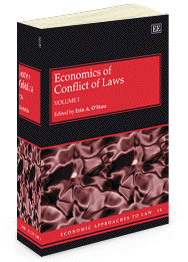Recently, the latest issue of the German legal journal Praxis des Internationalen Privat- und Verfahrensrecht (“IPRax“) has been published.
I.) Annotation on Color Drack
The issue contains inter alia an annotation by Peter Mankowski (Hamburg) on the ECJ’s judgment in Color Drack GmbH./.Lexx International Vertriebs GmbH of 3 May 2007 where the Court had to deal with the question of jurisdiction in cases where there are several places of delivery within a single Member State.
Mankowski outlines in his annotation six potential solutions, pointing out, however, that none of them is – due to the complexity of the issue – completely convincing. This is, according to Mankowski, also true with regard to the approach adopted by the ECJ, which has developed a two-stage solution for identifying the competent court in cases where there are several places of delivery within a single Member State: According to the ECJ, “the court having jurisdiction to hear all the claims based on the contract for the sale of goods is that for the principal place of delivery, which must be determined on the basis of economic criteria. In the absence of determining factors for establishing the principal place of delivery, the plaintiff may sue the defendant in the court for the place of delivery of its choice.”
Mankowski examines this solution critically and points out that determining the main focus of the deliveries, as advocated by the Court, implied uncertainty which contravened the aims of the Regulation. Also the subsidiary solution of the Court which shall be applied in cases where no main focus can be ascertained, the claimant’s choice, is regarded sceptically since the Court’s premise, in these cases all places of (part) deliveries were equivalent, could not be agreed with.
Due to the uncertainties which are attended with determining the main focus, Mankowski asks for further concretizing criteria and suggests to proceed – following choice of law rules which try to designate the law with the closest link to the case – from the assumption that it is decisive where the deliverer’s place of business which is in charge of the contract is situated. In cases where nothing is delivered at this place, Art. 5 (1) lit. c Brussels I Regulation referred to Art. 5 (1) lit. a Brussels I Regulation and consequently to national law.
See regarding this case also our previous posts on the Advocate General´s opinion, the judgment and further annotations.
II.) Contents
In addition to this annotation the new issue of the “IPRax” contains inter alia the following contributions:
- Article by Axel Halfmeier (Bremen) on the action raising an objection to the judgment claim (“Die Vollstreckungsgegenklage im Recht der internationalen Zuständigkeit”)
- Wolf-Georg Ringe (Oxford) examines the impact of the ECJ’s jurisprudence regarding companies’ freedom of establishment on international civil procedure law (“Überseering im Verfahrensrecht – Zu den Auswirkungen der EuGH-Rechtsprechung zur Niederlassungsfreiheit von Gesellschaften auf das Internationale Zivilprozessrecht”)
- Annotation by Herbert Roth (Regensburg) on a decision of the Court of Appeal Düsseldorf concerning the question of whether the debtor’s identity has to be clarified – in case of uncertainties – already during the proceedings for a declaration of enforceability (“Der Streit um die Schuldneridentität im Verfahren der Vollstreckbarerklärung nach Art. 41, 43 EuGVVO”)
- Annotation by Urs Peter Gruber (Halle) on a decision of the Court of Appeal Bamberg dealing with the question of whether proccedings for a declaration of enforceablilty according to Artt. 51, 31 et seq. Brussels Convention are suspended in case insolvency proceedings are opened with regard to the respondent’s assets abroad (“Inländisches Vollstreckbarerklärungsverfahren und Auslandskonkurs”)
- Annotion by Stefan Kröll (Cologne) on two decisions of the Court of Appeal Karlsruhe regarding the question of whether procedural irregularities which have allegedly occured at the place of arbitration can be raised in the proceedings for a declaration of enforceability (“Die Präklusion von Versagungsgründen bei der Vollstreckbarerklärung ausländischer Schiedssprüche”)
- Annotion by Marcus Mack (Heidelberg) on the U.S. Supreme Court decision in Sinochem (“Forum Non Conveniens – Abweisung ohne Zuständigkeitsprüfung”)
- Article by Stephan Balthasar (Munich) on the recognition and enforcement of German judgments on the Channel Islands (“Anerkennung und Vollstreckung deutscher Urteile nach common law auf den Kanalinseln und Verbürgung der Gegenseitigkeit”)
The full contents as well as news in private international law can be found at the journal’s website.
 Edward Elgar Publishing has published an edited collection of works on “
Edward Elgar Publishing has published an edited collection of works on “